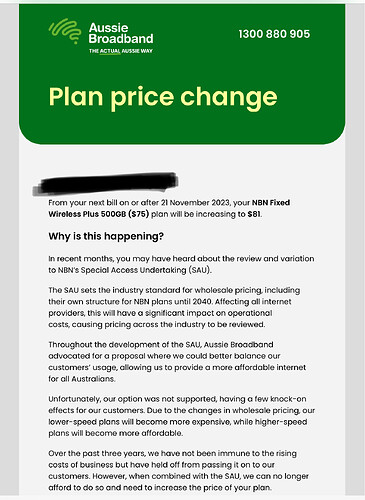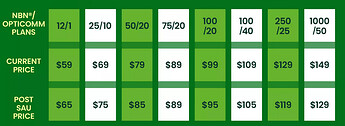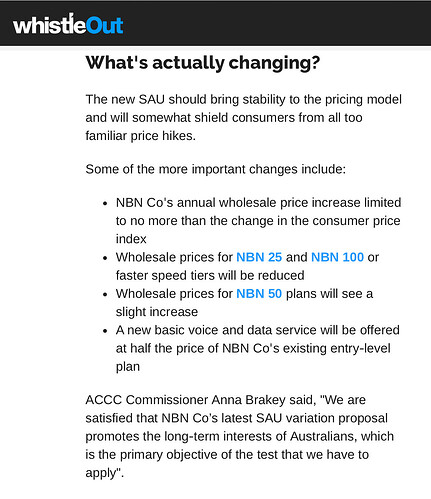The blog from Aussie Broadband about the changes:
"Aussie Broadband
Friday, 20 Oct 2023 | 2 min read
Think like an Aussie: What’s special about NBN’s new SAU
Written by Phillip Britt, Managing Director
FacebookTwitterLinkedin
[Email](mailto:?subject=Check out this post from Aussie Broadband&body=Think like an Aussie: what's special about nbn®...)

Overview
On 17 October the decision on the variation to nbn®’s Special Access Undertaking (SAU) was handed down, changing the rules that govern how Australia’s largest broadband network will operate until 2040.
The SAU was established in 2013, when 91% of Australian premises could connect through asymmetric digital subscriber line (ADSL), the top song on Triple J’s Hottest 100 that year was Vance Joy’s Riptide (still a favourite,) and Aussie Broadband celebrated connecting to our first NBN Point of Interconnect (POI) in regional Victoria.
It goes without saying, things are a little different now, and have been for a while. In 2021, NBN began formally consulting retailers like us to develop what a future pricing structure could look like. We made sure to consistently provide our feedback and offer solutions we believed would not only be economically viable for NBN but also best serve our customers and all Australians.
More than two years later, after many workshops and numerous submissions, we now know what that future state looks like.
In an era where more Australians are relying on the internet for work, education, and entertainment, it is crucial to ensure that high-speed, unlimited internet plans are affordable and accessible. On this we agree with NBN, and this SAU reflects their commitment to continue to grow broadband infrastructure across Australia, making faster speeds available to more Aussies.
This is good news for our customers on higher-speed 100/20, 100/40, 250/25, and 1000/50 plans, who will enjoy a price reduction come 21 November. We have been able to pass on these savings due to the removal of Connectivity Virtual Circuit (CVC) for these plans, something I have long advocated for. Removing CVC from pricing simplifies how we manage costs for our NBN customers on higher-tier plans, allowing us to provide savings for our customers through these pricing efficiencies.
Unfortunately, it’s not good news for all. For those on our lower tier 12/1, 25/10, and 50/20 plans, the new wholesale pricing in the SAU means we need to increase the price of these plans by $6 per month. These plans will still have a CVC charge attached, but now they will be individually charged based on a customer’s usage, rather than pooled to balance higher and lower-end users.

I’ve been open about my support of a flat wholesale pricing structure, especially for those on the 50/20 plan. The 50/20 tier represents about 45% of the overall market. By not only continuing to charge CVC, but doing so on an individual basis, the NBN has effectively forced our hand to raise prices for the majority of our broadband customers – and at a time of heightened financial uncertainty.
Regardless of the reasons, we know this will hurt for some customers, and we are here to help. Our customer service teams are ready to support our customers find solutions to keep Aussies connected through financial hardship as best we can.
One thing is clear – this SAU will impact Australians’ internet habits until 2040, but it will be a two-way connection. At Aussie we already see the growing need for more speed and bandwidth as more and more of our lives move online. By making higher-speed tiers more affordable, enabling continued investment in NBN’s network to reach more homes, and levelling the playing field for smaller retailers like us to provide real value against the big incumbents, this new SAU could empower more Australians to ramp up their service to enjoy faster, stronger connections.
For our part, we will continue partnering with the NBN, anticipating for the needs of our customers, and championing what we think will benefit all Aussies most."
So one of the changes made apparent in the blog was that the CVC (the amount of bandwidth the RSP pays for traffic between all their users premises and the POI (Point of Interconnect)) charge for the slower plans (12/1, 25/10 and 50/20) will be individually customer charged to the RSP based on usage, rather than pooling the usage of all those users to balance the cost across all, as it was previously done. On the faster tiers it appears it will be a flat fee for each AVC tier. (AVCs are the bandwidth allocated to the each end-user premises e.g., 25/5 or a 50/20 plan are examples of AVC allocation)
I am not sure, but It would appear that ABB have decided to increase the cost for all slower plan users to balance the cost themselves internally rather than sending individual bills to every user based on their individual usage. This could be an erroneous reading of the blog on my part; I based it on some historical background to this change (including NBN Co offers to axe CVC in exchange for yearly price hikes - Telco/ISP - iTnews).
It could still mean a future move to individual bills based on usage with a standard fee for a base CVC then some usage charge based on individual usage. This CVC base charge could be based on the wholesale included CVC allowance that NBN Co give for each AVC held by a RSP. As far as I know, current base CVC for plans: 12/1 it is 0.0 Mbps, for 25/5 it is 0.1 Mbps, and for 50/20 it is 2.45 Mbps; with Wireless (the up to 70 Mbps plans) at 2.45 Mbps as well. Most users in the slower speed tiers and particularly those on 50/20 exceed those base allowances on average usage over a month, the CVC is the combination of upload and downloaded data speeds.
I benefit from this current price change, my saving is $20 per month as we are on the 1Gbps/50 Mbps plan. While it is of benefit to my household, I feel for those who are facing increased budgetary impact from higher cost of connectivity. I would have rather seen a fixed/flat wholesale price structure that should have eased pressure on household budgets.




